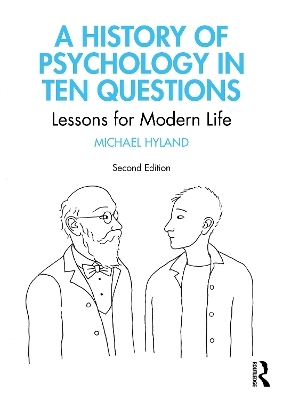
A History of Psychology in Ten Questions
Routledge (Verlag)
978-1-032-42831-4 (ISBN)
How do you know if something is true? How do you explain and control behaviour? What is the relation between psychology and physiology? How will artificial intelligence affect humanity? This book answers these and other questions by covering a wide range of topics in psychology, including neuroscience, personality, behaviourism, cognitive and humanistic psychology, qualitative methodology, inheritance and hermeneutics, all brought up to date with recent research. Drawing on the author’s own teaching, the book is structured around ten key questions where the history of psychology provides insight into modern life. Accessible for all readers, each chapter is also equipped with a ‘Lesson for modern life’ and nine ‘Essays and discussion topics’ so that readers can apply these ideas to their own thought practice. These provide interesting topics for discussion around issues that affect life and society.
This insightful text encourages readers to question their own lives and the wider society by providing an engaging introduction to debates in history and contemporary society. The book is also the ideal resource for undergraduate students of psychology taking CHIPS and other history of psychology modules, as well as anyone generally interested in learning more about this fascinating subject.
This text also has its own Instructors Resources, which includes Multiple Choice Questions, Student Slides and Lecture Slides. These will be available from Routledge’s Instructors Hub, once the book has published.
Michael Hyland worked as a lecturer and later professor of health psychology at the University of Plymouth, UK, retiring in 2018 after 44 years teaching history and theory in psychology.
Preface
1. How do you know if something is true? The logic of science and the psychology of scientists
2. What compromises should you make if you want to join a group of people? How psychology joined the science club
3. How do social attitudes influence science? Applied psychology, prejudice and intellectual snobbery
4. How do you explain and control behaviour? The rise of behaviourism and its replacement by the cognitive paradigm
5. Why does talking help? From psychoanalysis to the contextual model of psychotherapy
6. What is the relationship between psychology and physiology? Minds and bodies in theory and in practice
7. How do heredity and circumstances determine what people do and experience? The heredity-environment controversy, the person-situation debate and epigenetics
8. How should people’s differences and uniqueness be explained? Personality and humanistic psychology
9. What makes a good listener? What is the role of intuition and what questions should you ask? Academic qualitative research, commercial qualitative research, politics and hermeneutics
10. What happens when the whole is greater than the sum of its parts? From gestalt psychology to artificial intelligence, social robots and the future of humanity
| Erscheinungsdatum | 25.11.2023 |
|---|---|
| Zusatzinfo | 1 Tables, black and white; 12 Line drawings, black and white; 20 Halftones, black and white; 32 Illustrations, black and white |
| Verlagsort | London |
| Sprache | englisch |
| Maße | 174 x 246 mm |
| Gewicht | 610 g |
| Themenwelt | Geisteswissenschaften ► Psychologie ► Allgemeine Psychologie |
| ISBN-10 | 1-032-42831-7 / 1032428317 |
| ISBN-13 | 978-1-032-42831-4 / 9781032428314 |
| Zustand | Neuware |
| Informationen gemäß Produktsicherheitsverordnung (GPSR) | |
| Haben Sie eine Frage zum Produkt? |
aus dem Bereich


